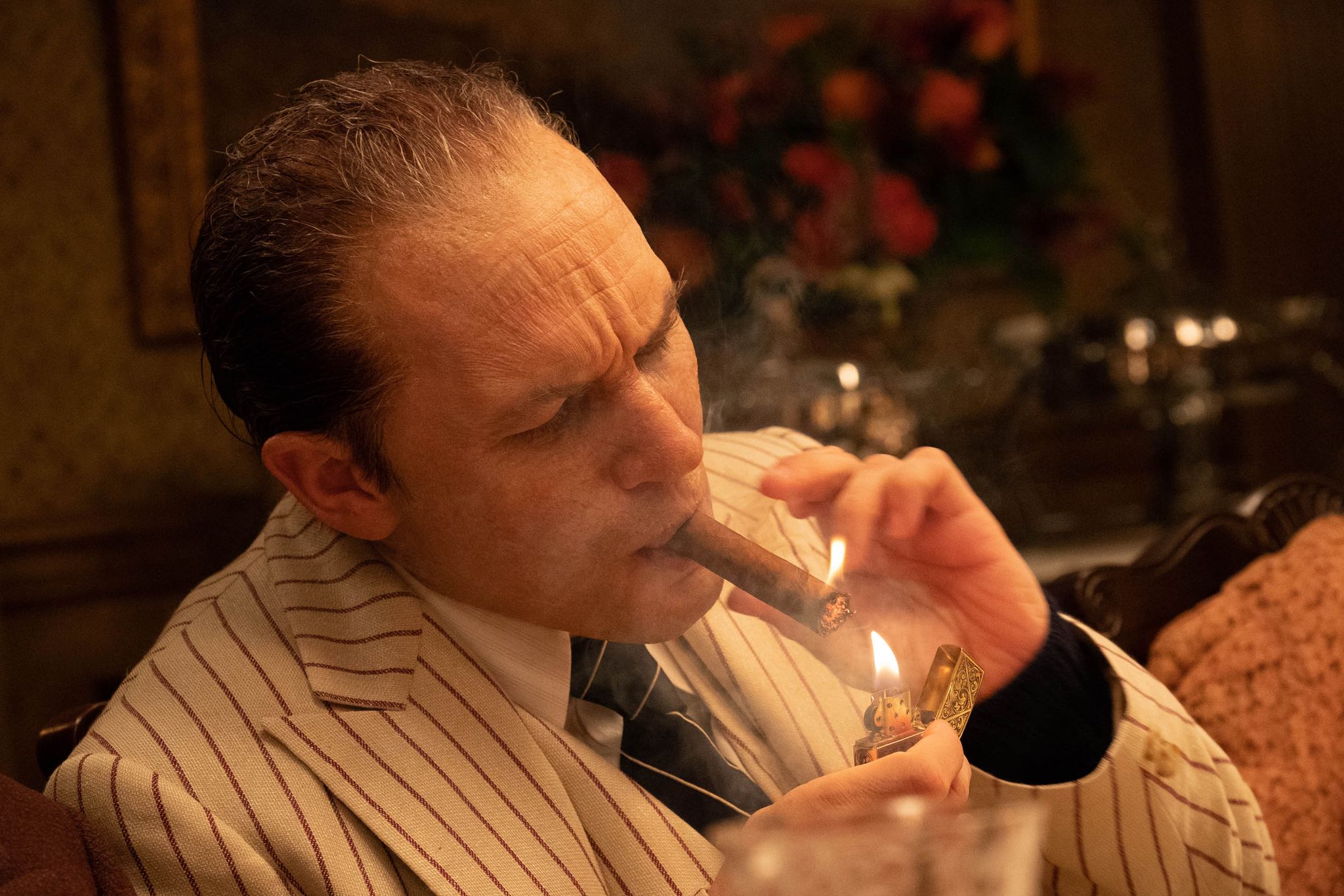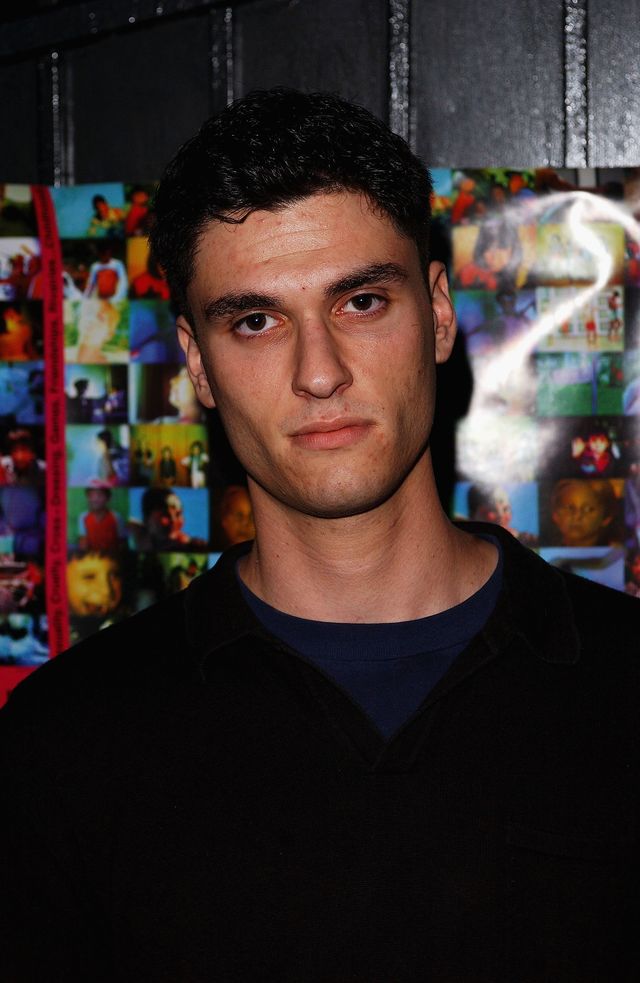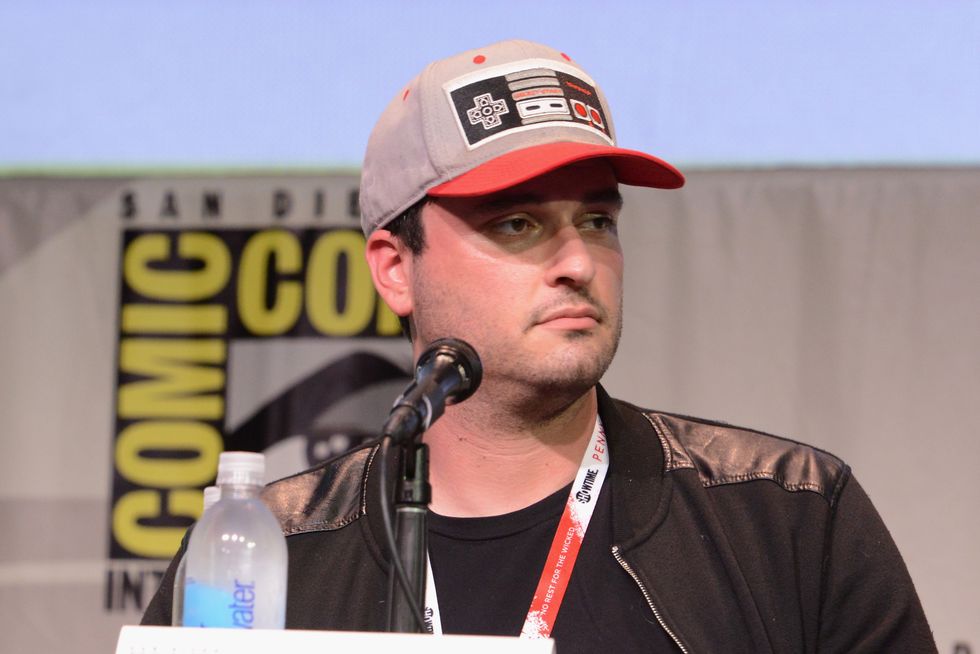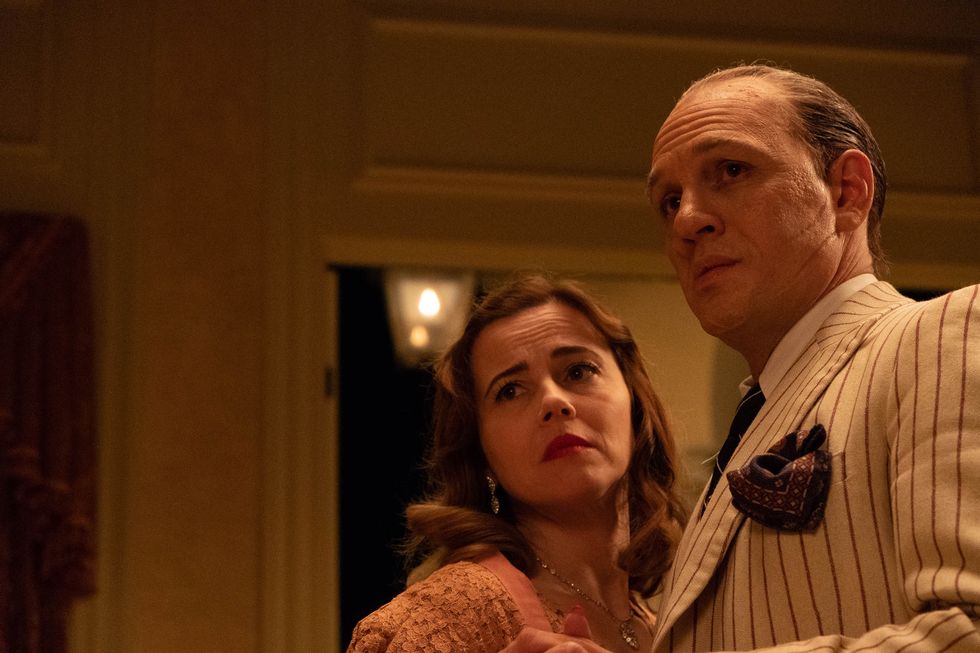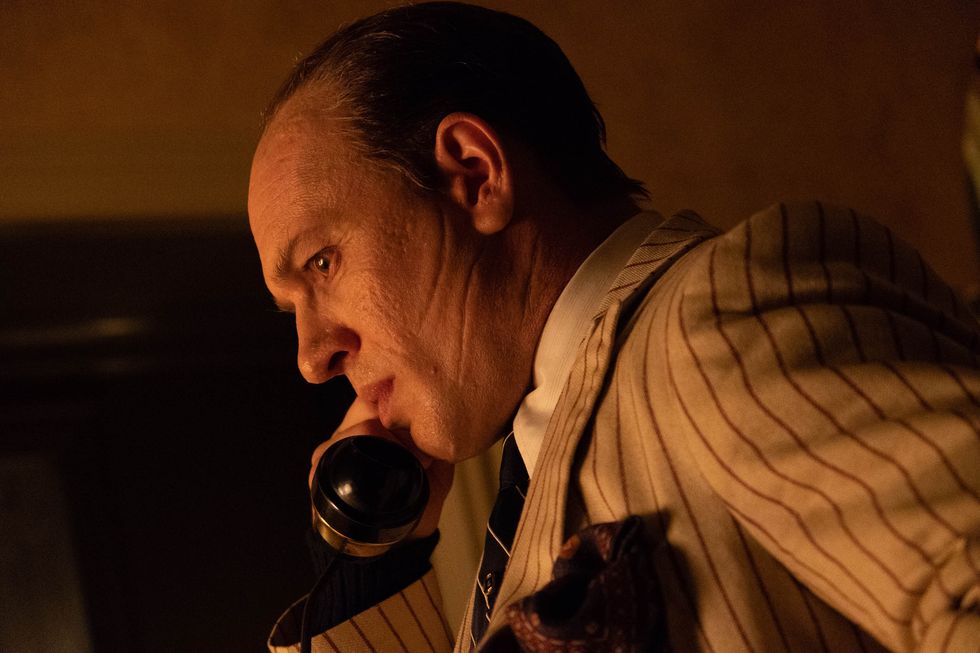Josh Trank is the first to admit that 2015’s Fantastic Four was “objectively terrible.” Yet in the aftermath of that failure—which led to an ugly public spat between him and Fox studio execs, as well as his departure from Lucasfilm’s planned stand-alone Boba Fett film—the 36-year-old filmmaker has finally returned, and in a big way. Capone (out now in the US, at a later date in the UK) is a daring and delirious take on the last year in the life of Al Capone, starring a magnetic Tom Hardy as the dementia-addled Chicago mobster. A trip through its notorious protagonist’s fractured, deteriorating mind, the film is a hallucinatory demystification of the mythic criminal, and for Trank—whose 2011 debut Chronicle remains a highwater mark of the found-footage genre—a triumphant rebound from a career-jeopardising catastrophe.
Co-starring Matt Dillon, Kyle MacLachlan, and Linda Cardellini, Capone is a mad head-trip, equal parts harrowing, terrifying and amusingly gonzo—epitomised by the sight of Hardy’s scarfaced kingpin singing along to The Wizard of Oz’s Cowardly Lion ditty “If I Were King of the Forest,” or wearing a diaper and chomping on a Bugs Bunny-esque cigar while mowing down friends and family members with a gold tommy gun. As the story of an on-the-ropes man tormented by his inescapable past, it’s not difficult to view the film as a highly personal one for Trank, who transforms Capone’s final days into a swirling reverie of traumatic nightmares and accusatory ghosts (as he says, “the movie itself has dementia”). Most of all, though, it’s proof that, even in the wake of his blockbuster misstep, the writer/director remains a formidable cinematic voice. In advance of Capone’s at-home premiere, we spoke at length with him about rallying after his Marvel misfire, his latest’s blurring of fact and fiction, and collaborating with the audacious Hardy.
Following your Fantastic Four and Star Wars ordeals, does it feel good to finally have a new film out? And are you surprised that everything regarding those two movies became such enormous news?
It’s mixed for me, because I can only say how I feel presently. When I was in therapy a few years ago after Fantastic Four came out, I had gotten in with the best therapist I’d ever had before. Rather than having me dive deep into all my past memories and talk about all these things and relive all this stuff, he’d just ask me, what do you feel right now? Forget about the past—what do you feel right now? Since then, I’ve just tried to stay in that mindset. And especially now, because of this movie coming out.
Given that we’re in this global pandemic, which has changed the world, it makes me feel bad and guilty on some level to say that I feel great and I’m really excited. But I am, about this movie, because I love this movie so much. I edited this movie, and I’ve been an editor before on movies that I loved and am proud of. Chronicle, my first film, I was very deep in the editing process with Elliot Greenberg on that, and with anything I’ve ever done—no matter how much I love anything that I’ve done—at a certain point, I can’t look at it anymore. But I’ve looked at this movie more, inside and out, backwards and forwards, than anything. I can watch this movie twice a day for the rest of my life. I love it. I made this movie to be a fan of this movie, and I’m really, really excited for other people out there to discover this movie for themselves and to find their own reasons to possibly love it.
Early on, before we started shooting this movie, I assumed that if all went well, it would amount to a kind of vindication of showing everybody that hey, I’m a good filmmaker, not the shitty crazy filmmaker you all think I am. I thought it would be a vindication, but it doesn’t feel like a vindication. None of that matters to me remotely. I feel like it’s such a reset. Rebirth, I think, is a bit much, and is a little too whimsical of a way of putting it. But in a way, it does feel like a personal rebirth into how I engage with cinema. Because if you come off of the worst experience of your life, and you have your name on something that’s objectively terrible, it makes you feel weird about even watching movies, because you feel like you’ve let movies down as a movie fan. Putting this movie out into the world, I feel like I’m contributing something unique that has its place in cinema in a really positive way. I hope that it inspires young people out there to pick up a camera and do something different.
Was that the big takeaway from this experience—to maintain your love of movies, and the desire to keep making them?
I use the term PTSD lightly, because I’m not a war veteran; I didn’t see my buddies die in the dirt. I was just humiliated on social media [laughs]. That was the worst of what happened, and that’s surreal in and of itself, because like many people—and especially many people in the film and cinephile community—I was bullied as a kid, and felt like an outsider. But when you’re bullied in real life, at least you have a tangible connection to it. When it’s on social media, it’s so abstract. It doesn’t make sense in a real life way, but it feels real, so it can make you crazier in a way. It just felt crazy. So there was a PTSD from that, and from mid-2015, it took maybe three years to wane. It just sort of melts away.
Going into this project, I’d had enough time. Writing this movie was a way of exorcising all of the weird feelings that had gone on. You’ve seen Capone, and it’s a movie about a man whose entire life is behind him at this point; he doesn’t connect to it in present time. We meet this guy and he’s this fun grandfather type of character running around with the kids on Thanksgiving, and everyone loves him. Then he’s sitting alone and he turns on the radio and hears a radio play about himself, and it’s kind of spooky, because this isn’t the person we were introduced to, and it’s clearly not the person he wants to be alone with when everybody leaves the room. That’s how I felt about myself.
By writing this movie, it very literally allowed me to engage in a tangible artistic positive way with that whole experience. Everything that’s in that movie is an artistic way of bringing people through that emotional process. I think the best thing about movies is that I didn’t have to literally make it about myself; it’s about Al Capone. And I hope that when other people watch this, they’ll be able to project their own personal traumas and regrets and past lives onto it on some level.
You’ve dropped hints about an alternate cut of Fantastic Four, but it doesn’t seem to actually exist. Can you talk about what that different version might have been like—or what your Star Wars/Boba Fett film might have resembled?
My best answer is, it’s twofold. One, I signed so many NDAs during that process that it would be legally irresponsible for me to go into the details of that. I’m perfectly comfortable talking about how I felt during that process, or instances of things that went on. But as far as work that involved other people and NDAs that we’ve all signed together, it wouldn’t be responsible for me to say all of that.
What I can say is that, despite all of my obvious creative differences with everyone involved on [Fantastic Four], from the head of Fox to [producer] Hutch Parker or [producer/screenwriter] Simon Kinberg, they wanted the movie to work too. In retrospect, sure, I was angry. And obviously, in the moment, I felt robbed of something, because there was a version of that movie that I loved so much that I’d put so much of myself into. But what I had to say then is so different than what I have to say now coming out of that experience. I have a different kind of respect for Simon and Hutch and Emma [Watts, Fox’s president of production] and everyone there, because they wanted it to work too—they just had a different idea of how they wanted it to work.
The end result was objectively terrible, and they know that too. So it would be hard for me to sit here at this point, five years later, and say they were wrong. Because we know they were wrong. I wasn’t right either. I was wrong as well. They felt what I did was wrong. The only difference is, I would hope that when a big studio takes a risk on a filmmaker with a point of view, that they’ll ride it all the way to the end, and let the world see what that person wanted to do.
But with a movie with so many visual effects and stuff like that, half of what was in there that was from my cut is unreleasable, because you need all this pre-vis, you need visual effects, you need all these other things. And it just doesn’t really matter so much. I’m just excited for Marvel/Disney to relaunch these characters in a way that everybody else will really love. I’m Jewish, so I always looked up to Stan Lee as the Jewish Walt Disney, and I love Stan Lee, and I’ve had the honour to meet him and sit with him a few times, and exchange some emails. He was such a wonderful, lovely, sweet, gentle human being, and I just hope that someday there’s an objectively terrific Fantastic Four for everybody to love, and for those characters to live forever in that way.
In light of the trouble you had on Fantastic Four, how difficult was it to get Capone off the ground—and was final cut a necessity?
Tom Hardy’s attachment and backing of my vision, and the really, really strong, beautiful collaboration that we had from the jump as soon as we met each other, was enough to get everybody else interested, and to also believe in me in a way that maybe they wouldn’t have before. Which I accept, and I understand.
I did have final cut on the movie. We ended up screening my cut last summer for a series of distributors, and I don’t know if it was about business or the riskiness of the movie’s content that turned all of them off, but people passed on it. At that point, the studio wanted another editor to look at it, despite my final cut and my work on the film. I felt like, rather than me go ballistic right now, this would be a good test to see what else the movie can be in another expert’s eyes. And the result was something that I didn’t feel compelled by. It was a very different type of thing that I don’t think would have worked on any level, and I don’t think anybody would have liked. It was very clear to everybody involved—Tom Hardy, the studio—when they looked at that new cut, it was a good test, because they were all in unison about the fact that my cut was the movie that we all wanted to make in the first place, and that we should stand behind that film, regardless of the fact that the big marquee distributors were a little scared of it.
That’s why I’m so thrilled that a company like Vertical came in and believed in it. The only compromise they asked of me was to change the title to Capone [from the original Fonzo], and that’s something I can live with, because it’s my final cut, and they loved the movie.
Capone is a film embedded inside its protagonist’s head. What was your research process like—and where did you get the inspiration for some of the fictional liberties taken with regards to Capone’s delusions, and experiences?
When I started writing it, I was already well-informed about Al Capone, from my own interest, in books that I’d read and documentaries that I’d seen. I already knew the story. It’s more of an experiential film about dementia than it is about a checklist biographical crime fiction Al Capone type of movie. In doing that, there’s a responsibility that I knew I had; I can’t just make up things. But the creative liberties had a lot to do with the fact that the movie exists in his head.
The way I like to put it is, the movie itself has dementia. That was the mantra on-set when we were making the movie. Whenever there were certain creative questions or we were coming up with stuff, it was the reminder that it’s the movie that has dementia.
As far as creative liberties, the personal doctor to Al Capone that Kyle MacLachlan plays is more of a composite of the actual doctor. There are similarities to the real-life doctor, but I have absolutely no evidence whatsoever that he had some sort of deal with the FBI. I don’t know that, which is why it was important to use that as a composite. Gino [Capone’s head of security]—I don’t know if he’s a person that existed. He’s a composite. Matt Dillon’s character is a composite. Everybody except the core family members are composites.
But again, they aren’t composites because I thought, as a Hollywood person, I could Hollywood-ise it, and just make an interesting story more interesting. It came out of the need to tell a story that takes place in a small window of time that represents an entire lifetime. That required the use of composite characters to represent so many types of real people and characters that would have existed in his life before the story takes place. And the fact that it’s about past trauma, and past instances, playing out in front of his eyes in real time without the use of flashbacks. It’s kind of a horror movie in that sense.
What was your collaboration like with Tom Hardy?
Tom’s one of my favourite actors, ever. I first saw Tom in a way that made me forever aware of him at Sundance 2009, in Bronson. I was there with a film, Big Fan, that I’d made with my friend Robert Siegel. I saw Bronson, and it just blew me away. The kind of actor that Tom is is so unique. He has the skills of just the most world class, prestigious Oscar-category actor, but he does something that many people in that class are afraid to do, which is he vaults himself into high-level theatrics that are so risky and so revealing. He allows himself to be so vulnerable in such a unique way.
When you read the Fonzo/Capone script, it’s hard to imagine anyone else going to all of the places that exist in the script like he would. I think any other really, really high-level actor would probably want to scale back a little bit on the elements that would maybe be a little humiliating on some level. That’s what’s incredible about Tom—he wanted to engage in a story that’s a deconstruction of masculinity in a way that would take all of his perceived masculinity away from him, and for the audience to understand that it’s all a façade at the end of the day.
I love Tom so much because he’s one of the few people I know who’s a truly manly guy—an alpha, a warrior—but he’s so vulnerable and open and really, really in touch with the emotional sadness of being misunderstood. That’s what this role required—someone who has the bravery to do that. Because otherwise, you’re going to get the opposite of what my goal was with this film, which would be more of a glorification of masculinity.
Capone is debuting on VOD, but there’s talk about it potentially landing in cinemas later this year. Is having it play on the big screen important to you, or was the priority getting it to audiences in whatever way possible?
It’s important that people have their health right now. That’s the most important thing. But now’s a time, more than ever, when people don’t have a lot to do at home and need new ideas and new things to watch and think about and reflect on, so I’m more than happy to give people something new to watch, whether it’s at home on a big screen or a small screen. It is what it is.
Obviously, there’s nothing that competes with the experience of watching a movie in a big movie theatre with the 7.1 Dolby Sound. I mixed the sound of this movie on a massive stage, colour-corrected it with Stephen Nakamura, who’s a legend, on a big stage. So I was more excited than anything for people to walk into a dark theatre and experience this movie. That was the plan with Vertical—we were going to come out this month, between 300-500 screens. Then the coronavirus hit, and I was immediately just like, that’s never going to happen, we don’t have theatres.
Hopefully we’ll get big-screen screenings of Capone down the line, because it is a different experience. The sound mix on this film is incredible. There are so many things you’ll hear in the theatre that I hope that, if people have the opportunity to experience that, they will. And I hope there’ll be theatres to do that in. But I’m just happy they can see it—that’s what’s important to me.
Having now completed Capone, are more projects on the horizon, or are you taking a breather?
Right now I’m working on a lot of original ideas and non-original ideas. It’s a reset for me. This is no regrets—we pick our paths and accept everything we’ve done—but if I could have done anything differently after Chronicle, I would have taken a few months off just to think about what films I’d want to give to the world of films. So that’s where I’m at right now. I’m working on a lot of spec scripts and seeing where my imagination can go, knowing that I made this film, that speaks so truly to myself. It allows me a different type of creative license to go to places that get me really excited, and waking up early in the morning and writing and dreaming.
Nick Schager is a NYC-area film critic and culture writer with twenty years of professional experience writing about all the movies you love, and countless others that you don’t.
